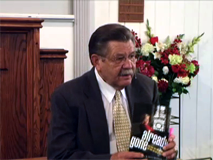Fortify Your Faith Individual Studies
Fortify Your Faith Individual Studies are single lessons on a variety of subjects. Some are from current presentations while others are preserved from older recordings.
Some have been restored from cassette tapes and previously recorded presentations. The preservation of such lessons is very labor intensive and time consuming because many are degraded and must be restored using expensive software. The sound quality is not as good as current recordings, but the content is still very valuable nonetheless.
The Three Phases of the Kingdom of God
A crown of thorns—an object of humiliation so undeserving of the King of kings.
Yet, it was the chosen path for our Lord. And through his death and resurrection, he was declared to be the King of heaven and earth.
In this lesson, we examine the concept of the kingdom of God in three phases: his kingdom revealed in the Old Testament, the establishment of Christ’s kingdom in the New Testament, and the revelation of the eternal kingdom which will exist in perpetuity following the Second Coming of Christ.
I believe this will be one of the most valuable lessons we will ever enjoy and prosper spiritually from—if we can truly grasp its significance.
Am I Your Enemy?
In what may to some seem like a shocking statement, Paul inquires of the Galatian Christians:
“So then am I become your enemy, by telling you the truth?”
In this lesson, we will examine this rich text from four different vantage points:
- The historical background of the text
- Some important observations about the grammatical construction of Paul’s inquiry
- Vocabulary considerations—every word of the text of the Bible is inspired by God and is placed for meaning
- The Practical application of the spiritual principles found in this passage
This lesson is not only a great personal Bible study, but it is also a classic instructional lesson on how to prepare an expository lesson.
Why We Are Losing Our Youth
In this online video, Wayne Jackson presents some of the latest research on Why We Are Losing Our Youth — specifically, why so many young people are abandoning faith.
In this video presentation, Wayne Jackson reveals:
- Why the growing trend of faithlessness among our youth is not an accident but instead is a well-organized conspiracy that is being systematically implemented at every level or our society.
- The extremely effective “X-factor” which atheists employ on your children at the earliest ages … which is destroying their faith faster than any other method.
- Damaging admissions from atheistic sources which prove the “X-factor” is completely bogus … but don’t look for them to stop using it any time soon … especially when so many Christians are vulnerable and unprepared to deal with it.
- How you can fortify the faith of your children against the “X-factor” atheists are using to destroy their souls.
- Three fake facts every parent needs to be prepared to counter.
- One powerful argument against two weak, compromising positions entertained by some Christians.
I Am Jehovah, The God Who Heals You
In the Old Testament, the children of Israel spent several centuries in Egyptian bondage. Through Moses, God freed them from slavery.
In the wilderness of Sinai, the Israelites came to a place called Marah where the water was bitter. But Jehovah cleansed the waters and made them sweet. Then, speaking through Moses, the Lord proclaimed,
“And he said, “If you will diligently hearken unto the voice of Jehovah your God, and will do what is right in his eyes, and will give ear unto his commandments and keep his statutes, I will put not of the diseases upon you which I have put on the Egyptians, for I am Jehovah who heals you” (Exodus 15:26).
Our Lord is powerful and he cares for his children and acts on their behalf. In this lesson, we probe the depths of a promise from Jehovah to the Israelites that still rings with hope and meaning for the faithful child of God.
The Synthetic Method of Bible Study
There are so many confusing doctrines in the religious community at large. Many are polar opposites.
However, in most cases religious error can be avoided with the application of some basic interpretive skills.
In this lesson, we explore the “synthetic method” of Bible interpretation.
First we will define the synthetic method.
Then we will explore a number of “real-life” applications of this important, fundamental approach to the Word of God.
The Amazing Providence of God
The Bible teaches that God is working providentially in His world to accomplish his will and in the lives of His children.
How long has it been since you sat down and reflected upon the providential activity of God in your life?
In this study, we examine the biblical teaching, the purpose, and the presence of our heavenly Father’s providence in our lives.
More importantly, we study how we sometimes undermine the effects of his providence in our lives.
The Little Known Case of Onesiphorus
There are many heroes found on the pages of the Bible. Some are notable and memorable—great characters of Bible history. Others are barely mentioned—unsung heroes mostly forgotten.
One little known character is a Christian man named Onesiphorus. His ministry to the apostle Paul was especially meaningful and warmly remembered by the great missionary to the Gentiles.
But few Christians know of Onesiphorus. His name appears only twice on the pages of the New Testament. Five verses in all refer to him.
In this study, we examine these five verses and extract rich treasures of faith from these brief and passing mentions of Onesiphorus.
There are two purposes in this study. First, to be encouraged by the story of Onesiphorus. Second, this lesson is a case study in how to take your Bible studies to a deeper level.
Enjoy and be thankful for the brief but meaningful mention of Onesiphorus in the Biblical record.
The Influence of Christianity
Where are the orphanages created and sustained by atheists? There are none. And before Christianity, it was common for orphans to be turned into slaves or left to die.
Kindness and benevolence is but one example of the great benefits humanity has enjoyed from the influence of Christianity.
But there are others. In this lesson, we examine several key gifts to humanity that flow from the blood of Christ and his disciples who faithfully serve him.
All Things Are Ready, Come To The Feast
But he said unto him, A certain man made a great supper; and he bade many: and he sent forth his servant at supper time to say to them that were bidden, Come; for all things are now ready (Luke 14:16-17).
So begins the parable of the sleighted invitation" which Christ taught during a supper of the Pharisees.
There are important and valuable lessons to learn from this poignant parable of the Lord.
The Bible Is the Word of God
There is an intense effort underway throughout our society to undermine the authority of the Bible.
One of the main fronts of attack is the assualt upon the divine authority of the Bible. If satanic forces can convince people that the divine record is nothing but a collection of ancient documents that may be valuable but not inspired, then the battle is over.
This attack is taking place in modern media, the university (and high school), and even in the pulpit.
But you do not have to be unarmed in this battle.
In this brief lesson, Wayne Jackson presents three powerful arguments for the divine origin of the Bible.
The Best Is Yet To Be
Elizabeth Barrett and Robert Browning were two of the greatest poets of Englands Victorian period. Their love for each other was the basis of many poetic love sonnets.
After her death, his work Rabbi Ben Ezra contains seed thoughts as the basis of this practical and stirring lesson on life.
Grow old along with me!
The best is yet to be,
The last of life, for which the first was made:
Our times are in His hand
Who saith, ’A whole I planned,
Youth shows but half; trust God: see all, nor be afraid!’
Both young and old will profit from the serious reflection on the Christian’s view of life.
He Restores My Soul
Probably the best known psalm is number twenty-three.
This favorite psalm is a comfort in our darkest hours, and is a source of great peace for those distressed from many trials.
In this study, we meditate on one little phrase from this beloved piece of poetry so packed with significance: “he restores my soul.”
May your soul be refreshed and restored with this study.
Help For A Troubled Youth
If a distraught mother asked you for help with her son who says that he no longer has any interest in Christianity, what advice would you give?
In this lesson originally delivered in the spring of 2000, Wayne Jackson shares with you the actual letter he received with this exact situation.
He also shares with you his response to her.
I know many parents are finding themselves in this situation. My hope and prayer is that this lesson will be of some service.
Righteousness Exalts A Nation
If we take a long, hard look at what is happening in the world today, it is sometimes difficult to comprehend one particularly important principle: that God is ruling in the kingdoms of men.
In this study, we let our minds reflect on the international judgement of God among the nations.
What does the Bible reveal about his political activity among the kingdoms of men?
What standard should we look to for our example in the affairs of human governments?
The Nature of the Resurrected Bodies of the Wicked
The Bible indicates that human beings were not created to be merely souls, but a being that possesses both a body and spirit.
While this fact is clearly evident in this life, revelation indicates this is a great and thrilling promise for those in the Lord. The redemption of our bodies and their eternal abode in heaven (like unto our Lord) is a great gift yet to be realized by the saints.
But little is said in scripture regarding the resurrection and nature of the wicked.
In this lesson, we explore some of the subtle hints regarding this interesting topic.
WARNING: This is not necessarily a very comfortable topic. But for the spiritually minded, it helps us make a sober evaluation of future events.
Crossing the Rubicon
A standing order forbade military leaders from bringing forces near Rome. In an act of rebellion, Julius Caesar led his army across the Rubicon river and reportedly said, “The die has been cast.” There was no turning back.
Just as Julius Caesar’s crossing of the Rubicon was a point of no return, there are many events in life that are also points of no return.
The crossing of the Rubicon by Julius Caesar has become a symbol of the point of no return. In this lesson, we examine religious and practical applications of this important principle.
Amazing Grace
Moses E. Lard once wrote about a particularly vile man who lived in his community that if old John would ever be saved, his theme song ought to be: “Amazing grace how sweet the sound that saved a wretch like me.”
I suppose every honest and contrite heart feels the same way. Grace is such a treasured thought on the pages of divine inspiration.
But grace is also one of the most misunderstood topics of the Bible.
Let’s explore this important topic that demands our interest and attention, as well as our honest reflection.
Great Is the Mystery of Godliness
“These things I write unto thee.” So begins Paul’s introduction to the “great mystery of godliness.”
As Paul was nearing the end of his ministry, he wrote to his young friends, Timothy and Titus. His desire to ensure their perseverance shines through these dark days for the tireless apostle.
In his letter to Timothy, he describes the mystery of godliness—and six foundational propositions that undergird the faith.
Savor these rich truths from the inspired pen of our beloved brother Paul.
God Who Knows the Heart
Hearts are a common symbol of love and affection. So much that it is one of the most popular icons in commerce.
When we think of someone with a kind or generous heart, we most often focus on the outward manifestation of those emotions. But God sees things altogether differently.
It is a comfort to think of a God who knows our hearts and can read them as easily as we read the letters on a page. But it can also be a scary thought when we consider those things we are most ashamed of and wish that no one knew.
In this study, we examine some riveting thoughts about the human heart and its relationship between it and the God who made it.
Attitudes Toward the Bible
In this lesson, Wayne Jackson discusses some common attitudes toward the Bible—both positive and negative.
On one hand, some attitudes are to be embraced and encouraged.
On the other hand, there are some attitudes that must be eliminated to whatever extent they have influenced our thinking.
Please be sure and leave your comments and thoughts about this lesson at the bottom of the page.
What the Church is Not
When trying to identify an object, it is important to carefully consider its characteristics. But sometimes it is also helpful to consider characteristics missing from the object.
In this lesson, we study the identity of Christ’s church from a negative vantage point—namely, what the church is not.
I think you will find this study of grave importance especially in today’s environment.
Be sure and leave a comment. Thanks.
Does God Hear My Prayer?
Have you ever wondered if your prayers to God are really heard? Is prayer just a psychological trick, or a true communication with a Holy Being?
No doubt, we have all asked ourselves this probing question—especially when it seems we struggle with one difficult challenge after another.
In this lesson, Wayne Jackson explores the subject of prayer and whether or not God really hears our prayers.
Psalm 103: An Anthem of Praise
It is so easy to “go negative” in all that is happening around us. But Psalm 103 reminds us of what is so right in our world—and how that outweighs all the negative.
In this lesson, Wayne Jackson outlines five great benefits the psalmist lists that causes us to break forth in praise towards our gracious God.
Do you need a word of encouragement? Listen to this lesson. Then—STOP! and spend an hour in private worship—praising God as did David.
When Will Jehovah Heal the Land?
I think this lesson is generally appropriate at all times, but especially in light of Newsweek Magazine’s cover article this week, The End of Christian America (4/4/09).
But more importantly, this lesson points to how we need to personally examine ourselves and seek God’s favor. As a nation, and as individuals, God’s promises for earthly blessings and judgement await our response.
The Crucifixion: In Remembrance of Him
This lesson given several years ago continues to inspire and motive one towards ever greater levels of faith. In our darkest hours, we can bring to mind the greatest gift of love from heaven we will ever know.
I hope you will be moved as I have been over the years in remembrance of him.
God Is Good
We like good things. But more than good things, we aspire to moral goodness even more. But where does goodness come from?
Our consciousness of good and evil is a powerful evidence for the existence of God. There is no natural explanation for our moral awareness. It is a divine thumbprint in our souls.
But then comes this question. If goodness comes from God, where does evil come from?
In other words, does the existence of evil in this world argue against the existence of a good God?
Is there, perhaps, a purpose in God’s permissive will allowing evil to exist?
Perhaps a more poignant question is this: why do you serve God?
While we generally acknowledge the goodness of God, have we ever stopped to think about the true significance of God’s goodness.
The Resurrection of Jesus Christ
There is no other event in human history that is as critical to our faith than the resurrection of Jesus Christ from the dead. It is the foundation stone of Christianity, the fulcrum of faith.
In First Corinthians, Paul argues that if Christ has not been risen from the dead:
- our preaching is in vain;
- your faith is in vain;
- our sins have not been forgiven;
- we have no hope;
- we are of all men most pitiable.
Being the cornerstone of our faith, it is therefore necessary that we confidently affirm Christ’s resurrection.
In this lesson, Wayne Jackson recounts the evidence for the bodily resurrection of Jesus Christ.



























Recent Comments